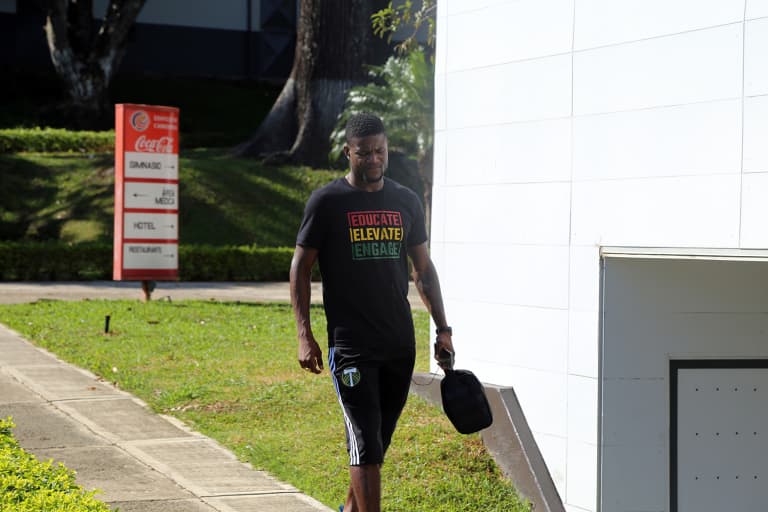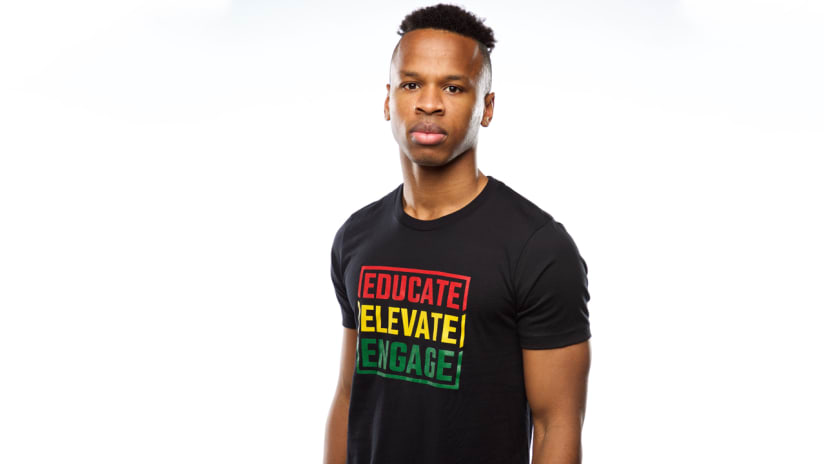SAN JOSÉ, Costa Rica -- “My big message to her, among other things, is that whatever we did, I wanted it to be a consistent thing.”
We sat down to talk about a t-shirt, but from the moment he drew his chair closer to mine – around the corner of a low table near in the middle of the Portland Timbers’ Costa Rica hotel – Jeremy Ebobisse is speaking to a larger vision. It goes far beyond a t-shirt.
He had been working with the Timbers’ Vice President of Community Impact, Kristel Wissel, since long before February 1, trying to come up with a plan for the month. At one time, the list of concepts was six items long - a brainstorm of initiatives Ebobisse and the club’s community service arm, Stand Together, could execute. The core of each idea was the same: How could Ebobisse’s message take center stage during Black History Month?
For Ebobisse, no matter what Stand Together did, it had to recognize one, bigger goal.
“I wanted to make sure whatever we did went beyond February,” he explained. “And a lot of that is still fluid, but a shirt, clothing, style, something that a lot of people take pride in, is not just going to be worn exclusively during the month.”
The design Ebobisse settled on was pressed in January, distributed to the Timbers before Portland left for Costa Rica, and was being worn by teammates to training sessions come the final days of January. When February arrived, the shirt went on sale at the team’s online store, with three terms that have become themes of Ebobisse interviews featured across its front.
“The shirt comes from different talks that I’ve had with different news outlets,” he says. “[We] chose to highlight three words: engage; elevate and educate.”

Dairon Asprilla in the new BHM shirt in Costa Rica (Photo: Kayla Knapp / Portland Timbers)
For Ebobisse, the relevance of those terms comes down to how black history has been cultivated, preserved and portrayed. “Sometimes, even in the context of Black History Month,” Ebobisse reminds, “[black history] is still filtered through different lenses,” making the three words he chose a roadmap, of sorts.
“Educate and engage go hand-in-hand, because you can educate yourself, but if you’re not really engaging in what you do, you’re just reading to check something off of a list. And you’re doing the work a disservice … It doesn’t make you a better person just because you’ve read it if you don’t take the time to understand it.
“And then engage in people. People have stories to share.”
The last word of Ebobisse’s trio amplifies his views on how black history is told. “When you talk about black history,” he says, “you really don’t talk about it.” Too often the lens through which it’s discussed, he feels, fails to highlight the voices that matter most.
“That’s why we talk about elevate,” he continues. “We need to elevate the voices that are doing the work; that have been doing the work for so long. As we talk about mass incarceration, for example, there have been sociologists doing the work for decades. Or even the opioid crisis, when we talk about that. There have been black people doing the work on drug addiction and what that means for decades, if not longer. The moment it starts to get attention, it’s for a different reason.
“The empathy didn’t begin when black people were starting to get more addicted at larger rates. It started more so to come public within the last decade or so, when we really saw the opioid crisis take off throughout the country.”
The example highlights the perils of excluding certain voices, as well as confining the discussion around black history to one month. Today, the face of the opioid epidemic has become rural and suburban white populations who’ve been given heightened access to prescription medications. Over the last few election cycles, politicians have tailored their messages to those victims, making their plights the focus of policies targeting the problem.
Had other voices been elevated sooner, Ebobisse implies, urgency may have set in before. In addition, if the pipeline for black stories wasn’t focused on a single month, the discussion of these issues would have a broader platform.
“[February] is still a month to tell a story, but [black history] shouldn't have to just be a month,” he says. “That’s the current situation …”
The potential of one t-shirt may feel like a small detail in a broader conversation about black history – or how black history is and isn’t told – but ultimately, that detail ties into Ebobisse’s bigger purpose: getting beyond a single month. February is “definitely an important” month in bringing awareness, he says, but it also serves as a platform that isn’t being fully actualized.
“Organizations have a big part in maintaining the dialog,” he says, explaining how some of the current stakeholders in Black History Month “really seize it and go all-in on February.” If those organizations’ visions were more evolved, though -- and focused on sustaining a message beyond one month -- the way their messages are delivered would be different. “Something [organizations] put out in February [can still] be popular in June. If anything, they can have more variety in June because it is a different season, and clothes are seasonal.”
Within February, black history is given space to have its stories told. Different participants, be they a Major League Soccer team’s website, an entire basketball league, or entities beyond sports, are amplifying voices within that space, highlighting their connections to that history. Come March 1, though?
“Outside of February, when you talk about black history, you really don’t talk about it,” he says. “The more I talk to people about what they’ve learned in school, the more I realize that it’s just not taught, even though it’s a fundamental part of American history. From the inception of this country, black people have been a majority shareholder in a lot of socioeconomic endeavors that have made the country successful.”
“The demand is there for learning about the culture,” he feels, “but people don’t always go out of their way to [learn]. And that’s where it’s about the individual. It’s important for the individual to hold themselves accountable, because while we look at political problems, socioeconomic problems this country faces, a lot of people are talking about how they’re not in tune with the issues. Then they hear me speak about it on a random podcast and say, ‘Wow, I really need to pay attention more.’
“And again, they fall back into the trap of comfortability, or even worse: Sometimes, they fall back into the blaming game. ‘I’m working hard. I’m doing well. Why can’t everyone just do that?’ If they understood the history of this country and looked at it through a less-filtered lens – or, honestly, through a black-filtered lens; because history is not written by black people – they would understand a little bit more.”
The shirt Ebobisse helped design may move the conversation forward, but from the clamor of a busy lobby in a San José hotel, it’s too early to see next steps. Still, for Ebobisse, the ideas are already in place. “Maybe the evolution would be, sporadically throughout the year, making apparel that’s thematically similar to black history, just to keep the conversation fresh in people’s minds.” There’s also the idea of organizing a series of discussions to pull in people beyond the Timbers, perhaps giving Thorns, Trail Blazers, and other people in Portland’s community a chance to share their questions and views.
“Black History Month isn’t for black people,” Ebobisse offers. “It’s not for people like me, or other people whose voices we’ll hear this month. We honor and celebrate black history every month through the way we live. It’s for those people who haven’t learned about black history. It’s for people who haven’t been exposed to the part of history that should be taught. It’s for the people who sit by idly as black voices are marginalized 11 months out of the year.
“Black history shouldn’t be limited to a month, but if it must, the people who need Black History Month should at least do it justice and commit to the culture.”
If Ebobisse has his way, that one-month limit will start to disappear. He’s committed to it. That’s what his latest effort, the t-shirt, is about. It’s about a persisting elevation of black history, not just a focus on one month.
“There’s just so much to learn,” he says. “If it wasn’t already clear, the conversation must go on forever.”












